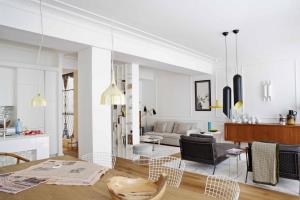Letter
You should spend about 25 minutes on this task. Write between 100 – 120 words.
You are going to spend a year in Bristol, UK as an exchange student and would like to rent a flat. Write a letter to your friend Sam:
- ask him/her to help you;
- describe the flat you would like to have.
Remember you have to write between 100 – 120 words.

An informal letter to a friend
You should note two key points:
- you are writing to a friend and so you can expect to use more informal language (short forms etc.)
- you have 2 items to include in your letter: ask him/her to help you and describe the flat you would like to have.
Understanding the dangers of informal letters
It is easy to get an informal letter wrong by forgetting the rules of good writing. Here are some dangers:
- you forget about a clear structure to your letter - so use paragraphs just like you would elsewhere
- you forget about range of vocabulary - informal doesn't mean oversimple
- you also forget range of grammar too.
Informal letters are chatty - think beginnings and endings
You are supposed to be writing to a friend, so it is a good idea to do what friends normally do - chat. In letters, this typically means that the letter opens with news and closes with the hope that you will see each other soon. This helps structure your letter.
For better vocabulary - think of synonyms and collocations
You should remember that vocabulary is important. One problem with letters is that they may look too simple and that you forget to use a range of vocabulary. One suggestion is that you think of synonyms and collocations for the words in the question.
Our advice would be to start the letter with a greeting - one good option would be: “Dear Sam”. Then you should ask how he is doing, and explain why you are writing (because you need help with the flat, explain that he is there so it would be easier for him to find a good flat). In the next paragraph explain what kind of flat you are looking for – here is some useful
vocabulary:
- Bedroom - A room used for sleeping in.
- Living room - The room in a house or apartment that is used for relaxing, and entertaining guests, but not usually for eating.
- Bathroom - A room with a bath and/or shower and often a toilet.
- Hall - The area just inside the main entrance of a house, apartment or other building which leads to other rooms and usually to the stairs.
- Utility room - Usually just for washing machine, freezer etc.
- Shed - A separated building from the house usually for storing garden tools.
- Loft - Space in the roof of the house usually used only for storage.
- Attic - Room in the roof space of a house (could be lived in.)
- Cellar - Room below ground level without any windows used for storage.
- Basement - Room below ground level, with windows, used for living and working.
- Landing - Flat area at the top of a staircase.
- Hall - Open area as you come into the house.
- Porch - Covered area before the entrance door.
- Pantry or larder - Large cupboard used, especially in the past, for storing food.
- Terrace or patio - Paved area between the house and garden for sitting and eating, etc.
- Study - A room for reading, writing, studying in.
- Balcony - An area with a wall or bars around it that is joined to the outside wall of a building on an upper level.
You should finish you letter with a closing phrase and point out you really hope he will help you and that you cannot wait to meet him.
Atsauce:
http://avadorausa.com/wp-content/uploads/new-york-city-apartment.jpg
http://www.e-architect.co.uk/images/jpgs/new_york/56th_st_apartment_e060810_5.jpg
http://cdn.freshome.com/wp-content/uploads/2013/06/apartment-light-colors-look-larger.jpg
http://visc.gov.lv/vispizglitiba/eksameni/uzdevumi.shtml